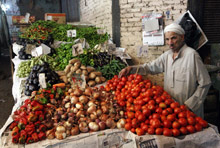
Typical street scene in Santa Ana, El Salvador. (Photo: iStock)
IMF Survey: Mideast Unrest Shows Need to Consider Bigger Picture
April 8, 2011
- IMF chief spotlights importance of broad access to economic opportunity
- Food and fuel crisis compounds effects of Mideast unrest in some countries
- Greater integration in North Africa could generate growth, employment
Unrest in the Middle East has highlighted the need to look beyond traditional measures when evaluating the economies of member countries, IMF Managing Director Dominique Strauss-Kahn told reporters.

Cairo vendor: Economists should look at the distribution of income in countries, not just overall growth, the IMF’s chief says (photo: AFP/Khaled Desouki)
MIDDLE EAST BRIEFING
Speaking to Middle Eastern journalists on April 6, in advance of the IMF-World Bank Spring Meetings, Strauss-Kahn said that the usual macroeconomic indicators such as growth, inflation, fiscal deficits, and other gauges are not sufficient to assess the true health of a country’s economy.
Countries such as Egypt and Tunisia have performed relatively well on a macroeconomic level in recent years, Strauss-Kahn said. But strong overall growth masked a serious problem of inequality within those economies. Since inequality can lead to unrest—which, in turn, leads to macroeconomic problems—the IMF should have paid more attention to the distribution of income, not just aggregate results, the IMF chief said.
“We have to take into account the fact that what could be destabilizing for growth is not only the situation of the banks, inflation, the asset bubble, the fiscal deficit, the current account deficit, but also things that have to do with the distributional effect,” he said.
Strauss-Kahn said the IMF would begin incorporating more data on unemployment and inequality into its analysis by working with other institutions that specialize in these areas, such as the World Bank, the United Nations, and civil society organizations.
Food and fuel prices
Strauss-Kahn observed that there were also inequalities across countries, not just within them.
The Middle East is being hit by a food and fuel crisis just as it is grappling with the economic effects of the unrest, Strauss-Kahn said, noting that food prices are nearing 2008 levels. While the region’s oil exporters would benefit from the rising price of oil, oil importers would be hurt. In oil-importing nations, higher energy and food prices could cost governments around 3 percent of GDP.
The full economic impact of the regional unrest is as yet uncertain, he said. Strauss-Kahn cited a significant first-quarter decline in tourism—an industry on which Tunisia and Egypt rely heavily—as taking a toll. How much time it would take for the sector to rebound is unclear, he said.
Regional integration
Asked about the need for Middle East economic integration, Strauss-Kahn told reporters that greater integration offers hope for boosting growth and employment, especially in the Maghreb, if countries are able to put aside their historical differences. “Tunisia, Algeria, and Morocco have a lot to gain from working together more,” Strauss-Kahn said, adding that “the benefits are so great that, frankly, there’s no choice.”
Algeria, a major oil exporter, could play a pivotal role. Benefiting from high oil and gas prices and a strong reserve position, Algeria is expected to weather the region’s current difficulties well. The country’s plans to develop its infrastructure could have a positive impact not just on Algeria but on the region as a whole, he said.
“Because Algeria is not only the biggest country but also the most central country geographically [of North Africa], the links that could be created would benefit the whole region,” Strauss-Kahn noted.
The IMF will publish a full update of its biannual Regional Economic Outlook for the Middle East and Central Asia on April 27.
After unrest erupted in Tunisia and Egypt, IMF Middle East and Central Asia Department Director Masood Ahmed said in February that governments should focus much more on inclusive growth and give better-targeted help to poorer households.
In an interview, Ahmed said that the events would clearly have a negative economic impact in the short run but, over the longer term, they could position Egypt and Tunisia to better exploit their potential to achieve higher standards of living and employment for all segments of the population.







